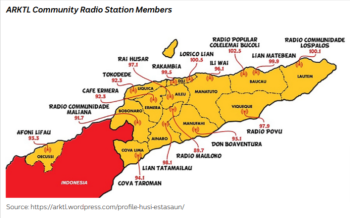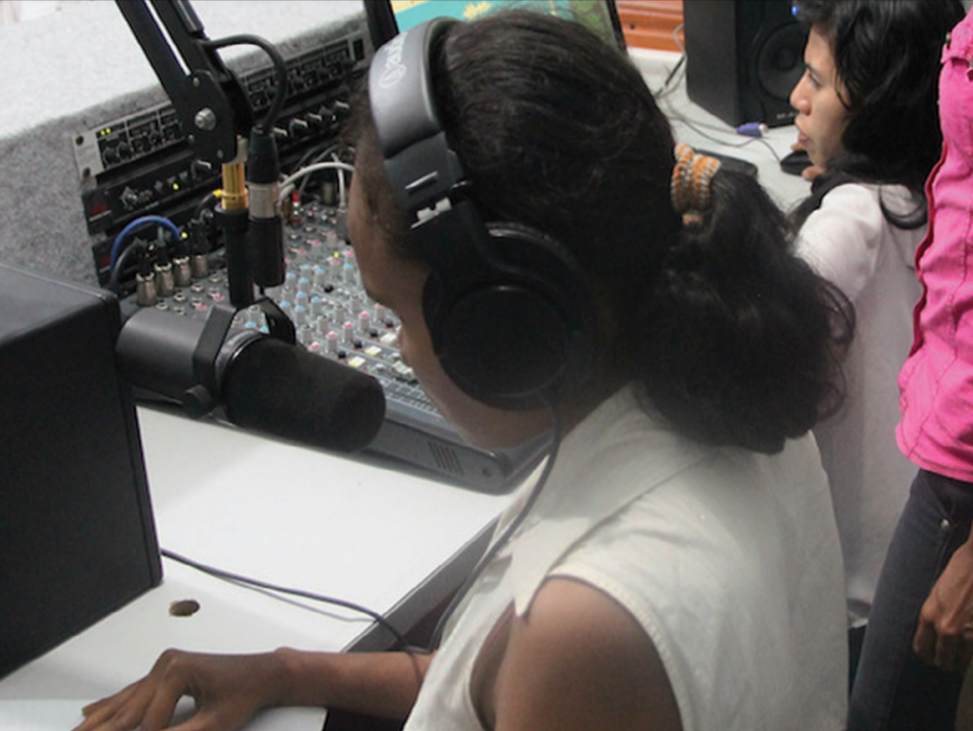A recent study conducted by ABC International Development (ABCID), in collaboration with The Asia Foundation titled State of the Media: Timor-Leste found that radio remains dominant in rural communities where TV access is limited.
The provides comprehensive new insights into Timor-Leste’s media sector, outlining achievements and challenges facing the industry in Asia’s youngest democracy, 22 years after independence.
ABCID is the Australian Broadcasting Corporation’s media development unit. It supports partner organisations in the Indo-Pacific region to pursue quality journalism, tell engaging stories and build strong connections with their communities.
The study provides valuable evidence for Timor-Leste’s media sector as it navigates a digital future and champions media freedom. State of the Media: Timor-Leste explores the landscape that resulted in the young nation being ranked 10th out of 180 countries in last year’s World Press Freedom Index.
 There are some 26 radio stations across the country. Two consistently broadcast nationally – RTTL and GMN’s Nacional FM – while a third, Radio Maubere, run by political party Fretilin, also broadcasts across the country but only during election campaigns. The remaining six non-community radio stations are all based in and broadcast to the capital: Radio Liberdade, Radio Metro, Radio M3, Radio STL, Radio Timor Kmanek (of the Catholic Church), and Radio Vox. All but two of the seventeen community radio stations are based outside Dili, where they remain the near-exclusive form of media specifically targeting the needs of those local audiences. Fifteen are members of theTimor-Leste Community Radio Association (ARKTL)4, 5, 6 The two non-ARKTL community stations were established with government support in early 2023, in Atauro7 and Turiscai.
There are some 26 radio stations across the country. Two consistently broadcast nationally – RTTL and GMN’s Nacional FM – while a third, Radio Maubere, run by political party Fretilin, also broadcasts across the country but only during election campaigns. The remaining six non-community radio stations are all based in and broadcast to the capital: Radio Liberdade, Radio Metro, Radio M3, Radio STL, Radio Timor Kmanek (of the Catholic Church), and Radio Vox. All but two of the seventeen community radio stations are based outside Dili, where they remain the near-exclusive form of media specifically targeting the needs of those local audiences. Fifteen are members of theTimor-Leste Community Radio Association (ARKTL)4, 5, 6 The two non-ARKTL community stations were established with government support in early 2023, in Atauro7 and Turiscai.
Economic sustainability was raised by respondents as the biggest challenge for media, with many smaller operations dependent on volunteer labour. Most broadcasters – including community radio – depend to some degree on government funding and subsidies.
While the data show that TV is more frequently accessed than radio, interviews with radio broadcasters revealed that radio remains the platform of choice for audiences without TV access in rural areas.
Reflections on potential benefits and/or pitfalls varied from all three community radio stations interviewed. There was a general concern about the local administration potentially appropriating the station as their official communication channel. Further to this, respondents believe that the role of community radio is still not well understood by either national or local administrators. These positions reflect different perceptions of current circumstances, with all three stations stating that their current relationships with local administrations are positive and productive.
Key research findings are:
- Timor-Leste’s media sector is committed to capturing ‘the voices of the people’ to inform government about community perspectives and experiences.
- Television is more frequently accessed than radio across urban and rural locations. However, radio remains dominant in rural communities where TV access is limited. 21% of all respondents reported they listen to radio a few times a week.
- TV is the most trusted media source among citizens.
- Mis/Disinformation, or ‘hoaxes’, is seen as a significant problem.
- Economic sustainability was raised by respondents as the biggest media issue.
- Balanced coverage is an industry-wide challenge.
- Digital literacy and cyber security will need future attention.
ABC International Development Lead Jo Elsom said: “We’re excited to work with our Timorese partners to fill this knowledge gap and contribute to a better understanding of the media sector in Timor-Leste. Media can use this new information to help shape and strengthen their futures, to address business viability and meet audience needs.”
The Asia Foundation’s Country Representative in Timor-Leste, Héctor Salazar Salame, said: “The Asia Foundation has been a long-time supporter of a free and independent media in Timor-Leste. We believe that an independent media is a critical part of Timor-Leste’s vibrant democracy, and we commend Timor-Leste for maintaining one of the ‘most free’ media environments in Southeast Asia.”

